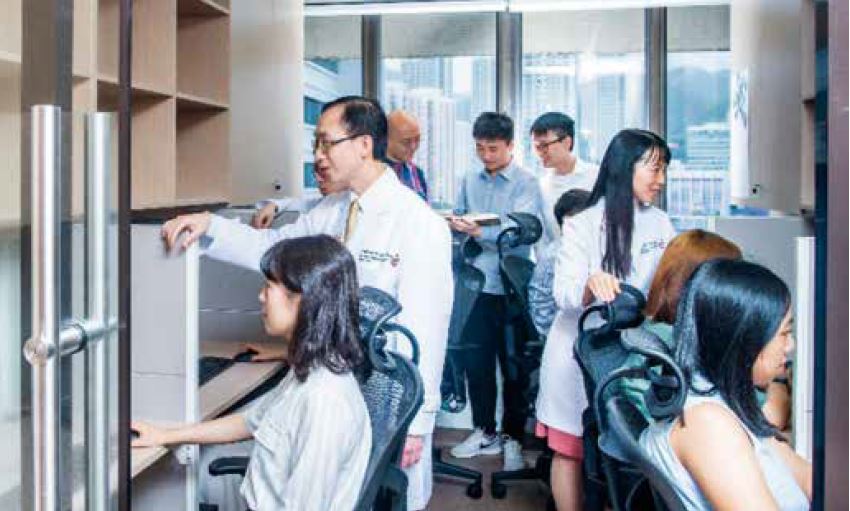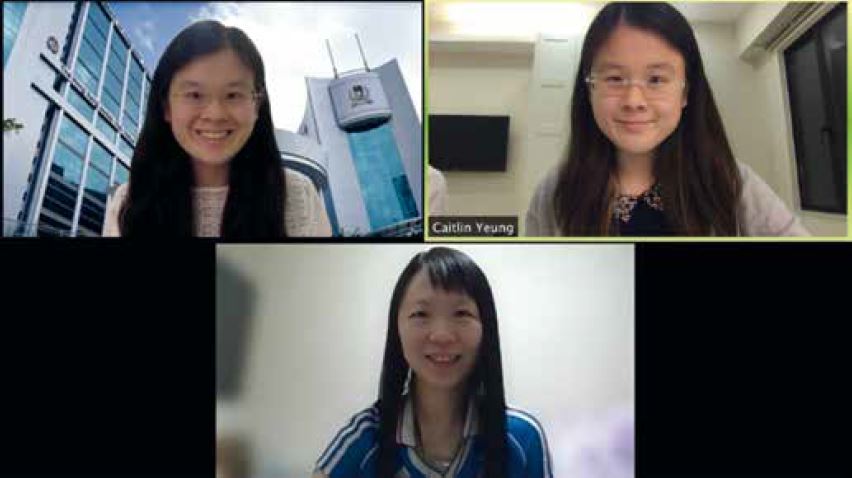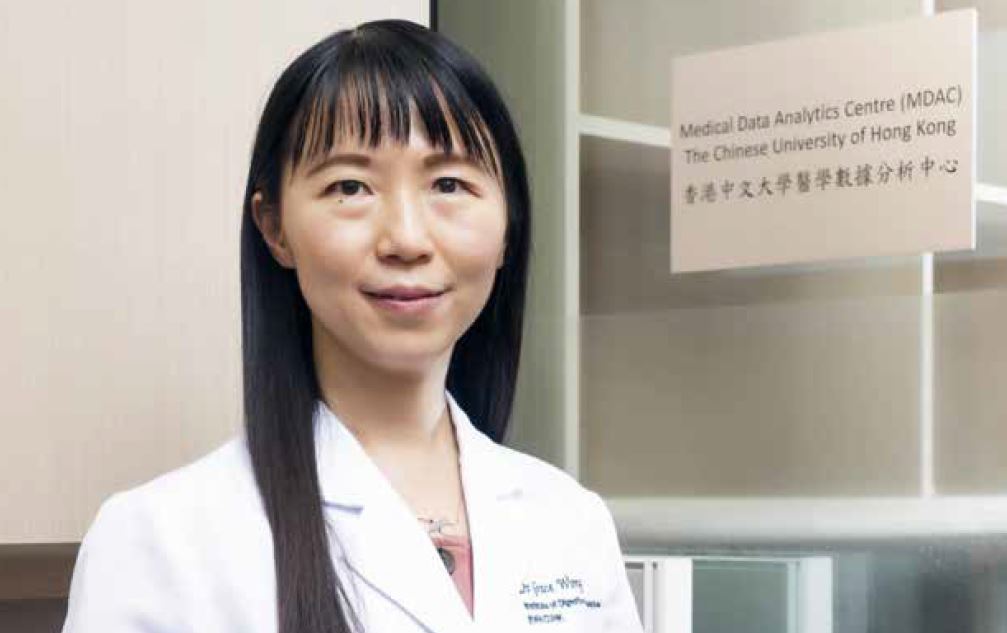© Hong Kong Academy of Medicine. CC BY-NC-ND 4.0
HEALTHCARE FOR SOCIETY
Delivering hope in hepatology: an interview
with Professor Grace Lai-hung Wong
Maegan Yeung1, Caitlin Yeung2
1 Year 4 MBBS, The University of Hong Kong
2 Year 6 MBBS, The University of Hong Kong
Prof Grace Lai-hung Wong’s tenacity and passionate humanitarian spirit have fuelled her career at the
forefront of tackling various gastrohepatic conditions
in Hong Kong.
From humble beginnings:
excellence is no accident
Prof Wong attributes her first forays into the
medical system to a series of accidents, including
an actual traffic accident during her first year of
secondary school that left her with a broken femur.
Experiencing the doctor-patient relationship from
the patient’s side in her formative years not only
bolstered her desire to become a doctor, but also
helped Prof Wong understand the importance of
viewing the situation from the patient’s perspective.
This conviction shaped her career over the years to
come.
Nonetheless, Prof Wong’s success is, by no
means, an accident. Looking back, Prof Wong
attributes her unyielding tenacity and determination
to her humble grassroots upbringing. She recalls
growing up in a cramped 100-square-foot rental
flat that could barely fit a wardrobe and a bunk bed.
During that time, she took great inspiration from her
father who, in order to support his family, worked
as a construction worker and never took a day off.
These circumstances in her early development
instilled an unshakable work ethic and steeled her to excel in her academic pursuits. An outstanding
student at secondary school, Prof Wong became the
Tuen Mun district top scorer in the public exams
and successfully enrolled to study medicine at The
Chinese University of Hong Kong (CUHK).
Clinical trials and tribulations
During her time as a trainee Medical Officer at the
CUHK Department of Medicine and Therapeutics,
Prof Wong met her mentor Prof Henry Chan, who
noticed her blossoming research talent. As a budding
researcher, Prof Wong found that the publication
process is laden with rejection and disappointment.
Despite this, Prof Wong persevered with her
research, starting with a small retrospective cohort
study, and quickly established a prolific research
profile. Her research has been recognised in Hong
Kong and internationally through various awards
and prestigious lectureships, including the Young
Investigator Award of the Asian Pacific Association
for the Study of the Liver, the Distinguished Research
Paper Award for Young Investigators of the Hong
Kong College of Physicians, the Hong Kong College
of Physicians Sir David Todd Lectureship, and the
JGH Foundation Emerging Leader Lectureship.
Today, Prof Wong continues to work as clinical
professor at the Department of Medicine and
Therapeutics, Institute of Digestive Disease, and
State Key Laboratory of Digestive Diseases of CUHK.
New life new liver: giving back to
society
Outside of the clinic, Prof Wong is an avid
humanitarian. Her long-standing involvement
in charity work began when she was a medical
student, where she participated in service trips to
rural areas in mainland China. In recent years, she
has been heavily involved in the New Life, New
Liver programme jointly launched by the Center
for Liver Health of CUHK and the non-government
organisation Caritas Lok Heep Club.
New Life, New Liver is a targeted screening,
assessment, and education programme to help
efforts towards the elimination of hepatitis C virus
(HCV) in high-risk individuals, such as people who inject drugs. The programme aims to raise awareness
about HCV in underprivileged and at-risk groups by
distributing books and brochures and holding talks
on HCV infection, complications, and treatments.
At these educational sessions, point-of-care anti-HCV testing is available. Individuals who screen
positive can be recommended to attend follow-up
examinations at local hospitals or hepatology units,
and support can be provided to improve medication
adherence.
As a result of the efforts of the New Life,
New Liver programme, Prof Wong noted drastic
improvements in the targeted individuals, many of
whom are homeless or marginalised. Among the
patients, only one in five were willing to receive
medical treatment, and there initially were many difficulties in engaging these at-risk populations
to participate in the programme: “It is incredibly
difficult to get a homeless patient to care about their
liver when they have more pressing issues on their
mind, such as what their next meal is, or where to
sleep that night.”
In the 9 years that the programme has
been running, there has been a notable increase
in treatment uptake. The collaborative efforts of
experienced professionals across medical and
sociological fields towards the elimination of HCV in
Hong Kong lifts the burden of disease from patients,
allowing them to move on and pursue their dreams.
However, Prof Wong notes that there is still a lot of
work to be done. The programme has an important
place in her heart as she experienced the camaraderie
and wealth of expertise from working with the
multidisciplinary team of healthcare professionals
and experienced social workers.
Future perspectives: regeneration
and mutations
In recognition of her contributions to society, Prof
Wong was awarded the Ten Outstanding Young
Persons Award in Hong Kong in 2014. She credits
her mentor, Prof Henry Chan, for providing her with research opportunities early in her career and
guiding her through the application. As the Assistant
Dean (Learning Experience) at the CUHK Faculty
of Medicine, Prof Wong is tasked with mentoring
medical students. Just as the liver regenerates, Prof
Wong hopes that this new generation will ‘regenerate’
the medical profession.
Currently, Prof Wong is the also Director
of the newly established CUHK Medical Data
Analytics Centre, and is currently working with
a multidisciplinary group of experts in computer
science and biostatistics to build models and artificial
intelligence systems from large-scale clinical data to
aid early detection of gastrohepatic conditions. “Just
as hepatitis C viruses mutate very quickly to acquire
drug resistance,” says Prof Wong, “we as doctors
need to ‘mutate’ too. We need to be flexible and
find new ways to improve the efficiency and efficacy
of our treatments, to provide the best possible
treatment for our patients.” On her online profile,
Prof Wong describes herself as “a hepatologist, a
researcher and a mother of three kids who loves to
sing.” However, this interview showed that she is
more than that. Serving as a role model to doctors
and medical students, Prof Wong also provides hope
to her patients by embracing not only clinical but
also technological advances.

Figure 2. Prof Grace Wong overseeing work at The Chinese University of Hong Kong’s Medical Data Analytics Centre

Figure 3. Hong Kong Medical Journal Student Reporters Maegan Yeung (left) and Caitlin Yeung (right) interview Prof Grace Wong (bottom)


